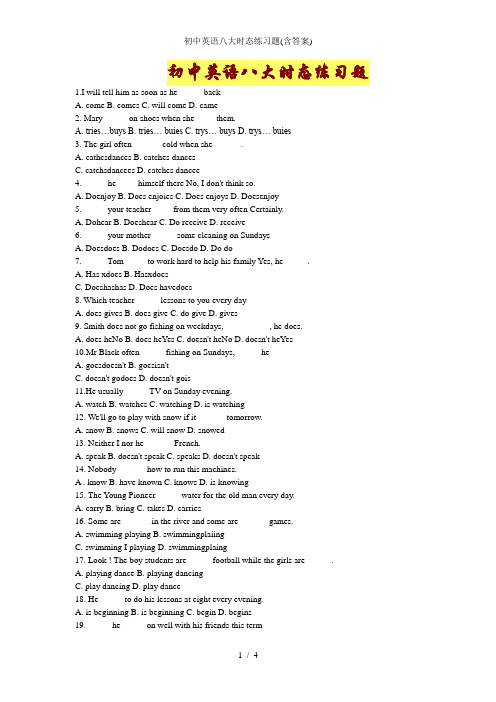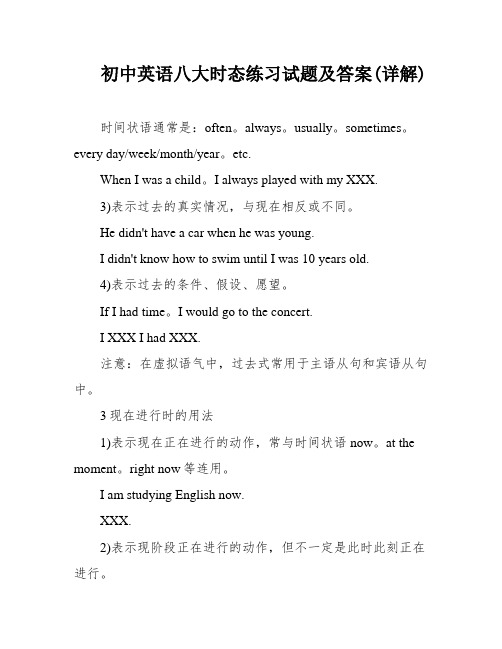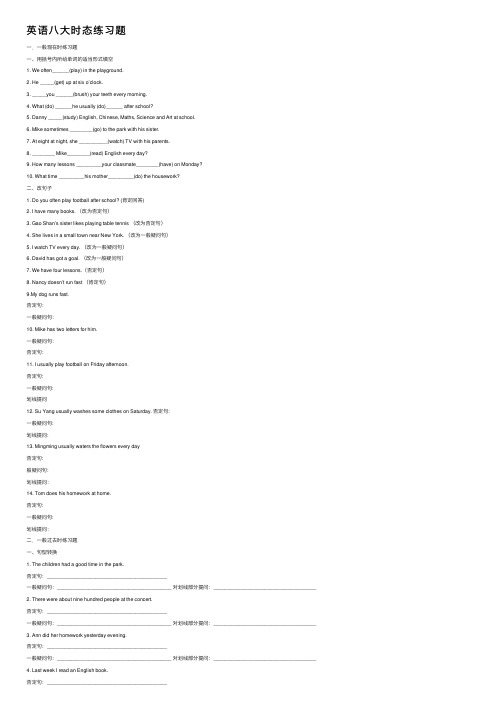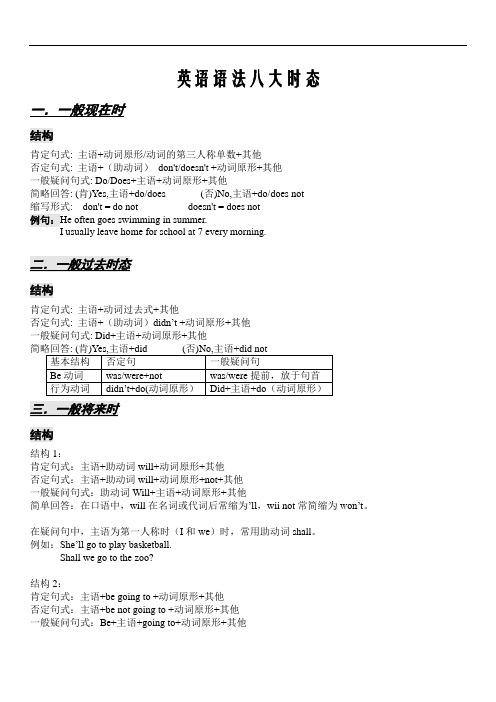八大时态练习题
初中英语八大时态练习题(含答案)

初中英语八大时态练习题1.I will tell him as soon as he _____ backA. comeB. comesC. will comeD. came2. Mary _____ on shoes when she ____ them.A. tries…buysB. tries… buiesC. trys… buysD. trys… buies3. The girl often ______ cold when she ______.A. cathcsdancesB. catches dancesC. catchsdanceesD. catches dancee4. _____ he ____ himself there No, I don't think so.A. DoenjoyB. Does enjoiesC. Does enjoysD. Doesenjoy5. _____ your teacher ____ from them very often Certainly.A. DohearB. DoeshearC. Do receiveD. receive6. _____ your mother _____ some cleaning on SundaysA. DoesdoesB. DodoesC. DoesdoD. Do do7. _____ Tom _____to work hard to help his family Yes, he _____.A. Has xdoesB. HasxdoesC. DoeshashasD. Does havedoes8. Which teacher _____ lessons to you every dayA. does givesB. does giveC. do giveD. gives9. Smith does not go fishing on weekdays, ____ _____ , he does.A. does heNoB. does heYesC. doesn't heNoD. doesn't heYes10.Mr Black often _____ fishing on Sundays, _____ heA. goesdoesn'tB. goesisn'tC. doesn't godoesD. doesn't gois11.He usually _____ TV on Sunday evening.A. watchB. watchesC. watchingD. is watching12. We'll go to play with snow if it ______ tomorrow.A. snowB. snowsC. will snowD. snowed13. Neither I nor he ______ French.A. speakB. doesn't speakC. speaksD. doesn't speak14. Nobody ______ how to run this machines.A . know B. have known C. knows D. is knowing15. The Young Pioneer _____ water for the old man every day.A. carryB. bringC. takesD. carries16. Some are ______ in the river and some are ______ games.A. swimming playingB. swimmingplaiingC. swimming I playingD. swimmingplaing17. Look ! The boy students are _____ football while the girls are _____ .A. playing danceB. playing dancingC. play dancingD. play dance18. He _____ to do his lessons at eight every evening.A. is beginningB. is beginningC. beginD. begins19. _____ he _____ on well with his friends this termA. DoesgetsB. DoesgetC. IsgettingD. Isgeting20. Mr Smith _____ short stories, but he ____ a TV play these days.A. is writingis writingB. is writing writesC. writes is writingD. writes writes参考答案:1—5 BABDB 6—10 CDDBA 11—15 BBCCD 16—20 CBDCC21. I _____ to the cinema. I ______ there every Sunday.A. go…goB. am going… goC. go… am goingD. am going…am going22. Look, they______ a good time, ____ theyA. have…doB. have…don'tC. are having…areD. are having aren't23. You ______ about the future now, ______ youA. don't thinkdon'tB. aren't thinking aren'tC. don't think doD. aren't thinking are24. She always ______ something whenever she ______.A .studiedplayed B. studiedplaiedC.. studiedplaiedD. studied played25. He often _____ late in the forest. It _____ me very much.,A. stayedworriedB. staied worriedC. stayedworryedD. staied worried26. I ______that the boy _____ with no tears in his eyes.A. noticed cryedB. noticed criedC. noticedcriedD. noticed cryed27. We _____the floor and _____ all the windows.A. mopped cleannedB. moped cleanedC. moppedcleanedD. moped cleaned28. When I _____ the Children's Palace, the children _____ with joy.A. visited jumppedB. visited jumpedC. visited jumpedD. visited jumpped29. ______ a sports meet last Sunday Yes , they ______.A. Did they have didB. Did they have hadC. Had they hadD. Had they did30. ____ you _____out for a walk after supper Yes, I ______.A. DidwentwentB. Did go wentC. Did went didD. Did go did31. _____ Jack _____ on with his work or ______ to have a restA. Did went stoppedB. Did go stopC. Did went stopD. Did go stopped32. You gave them a talk two days ago, _____you Yes, I ______.A. did didB. did gaveC. didn't didD. didn't gave33. ____ your brother _____ a letter to My father.A. Who wroteB. WhatwroteC. Who didwriteD. What did write34. They _____ about the TV news then in the sitting-room. They often ____ such talksA. talkedhadB. talkhaveC. were talkinghadD. are talkinghave35. He ______ some cooking at that time, so _____ me.A. did heardB. did didn't hearC. was doing heardD. was doing didn't hear36. " _____ you angry then " "They_ too much noise."A. Arewere makingB. Werewere makingC. AremadeD. Were made37. This time yesterday Jack _____ his, bike. He _____ TV.A. repaired didn't watchB. was repairing watchedC. repaired watchedD. was repairing wasn't watching38. We _____ for Tom at ten last Sunday. He often kept us ______.A. were waiting waitingB. were waiting waitC. waited waitingD. waited wait39. When you _____ at the door, I _____ some washing.A. knocked didB. was knocking didC. knocked was doingD. knock am doing40. The boy_____ English on the radio when I _____ his door.A. learned was openingB. was learning openedC. learned openedD. is learning open参考答案:21-25 BDDDA 26—30 BCBAD 31—35 BCCCD 36—40 BDACB41. When they______ through the forest, a bear _____ at them.A. walked… was comingB. were walking… cameC. were talking… comesD. walk… is coming42. A young man _____ her while she _____ her work .A. watched was finishingB. was watching finishedC. watched finishedD. was watching was finishing43. While mother _____ some washing, I ______ a kite for Kack.A. did madeB. was doing madeC. was doing was makingD. did was making44. I _____ myself French from 7 to 9 yesterday morning. I _____ to work.A. was teaching didn't goB. taught didn't goC. was teaching wentD. taught went45. He _____ a model plane when I came to see him.A. makesB. is makingC. was makingD. made46. I ______ a letter at nine last night.A. is writingB. was writingC. wroteD. is writing47. The teacher_____ (give) us a history lesson when Tom walked into the classroom.A. gaveB. is givingC. was givenD. was giving48. There will be a football match in two days, that is _______.A. last SundayB. next SundayC. every SundayD. this Sunday49. We ______ class meeting this November.A. hadB. haveC. will haveD. are having50. He ______ in his garden every morning next year.A. will workB. worksC. workedD. is working51. Be careful. The train ______.A. will comeB.C. comesD. is coming52. Look at those clouds. It _____ soon, I'm afraid.A. is going to rainB. is rainingC. will rainD. won't rain53. The radio says it ______ the day after tomorrow.A. is going to snowB. is snowingC. will snowD. snows54. _____ he _____ some shopping tomorrow afternoonA. WilldoesB. is going to doC. isdoingD. Shall do55. What day _____ it ______ tomorrow Wednesday.A. is going to beB. willbeC. shallbeD. doesbe56. The boy _______ sixteen years old next year.A. is going to beB. is growing to beC. will beD. is57. _____ you ____ me up at six, pleaseA. Aregoing to wakeB. ArewakingC. WillwakeD. Dowake58. If he ______ to college, he _____ a lot more.A. will gowill learnB. will gois going to learnC. is going is going to learnD. goes will learn59. When she _____ next time ,l ______ her everything.A. is going to comeshall tellB. will comeshall tellC. comeswill tellD. comewill tell60. What day ____ it ____ tomorrow It ____Tuesday.A. is…going to be… isB. will…be…willC. is…going to be…is goingD. will be…will be 参考答案:41-45 BDCAC 46—50 BDDCA 51—55 DACBB 56—60 CCDCD。
专升本八大时态练习题

专升本八大时态练习题在英语语法中,时态是表达不同时间动作或状态的重要方式。
以下是针对专升本考试的八大时态练习题,帮助同学们巩固和提高时态运用能力。
一、一般现在时1. I ________ (study) English every day.2. She ________ (work) in a bank.二、一般过去时3. We ________ (go) to the cinema last night.4. He ________ (write) a letter yesterday.三、一般将来时5. They ________ (visit) the museum next week.6. I ________ (buy) a new computer next month.四、现在进行时7. Look! The children ________ (play) in the park.8. She ________ (cook) dinner now.五、过去进行时9. I ________ (read) a book when you called me last night.10. They ________ (discuss) the project when the boss came in.六、现在完成时11. I ________ (finish) my homework already.12. She ________ (live) in this city for ten years.七、过去完成时13. We ________ (arrive) at the airport before the flighttook off.14. He ________ (study) French before he went to France.八、将来完成时15. By the end of this year, he ________ (work) here for five years.16. By the time she gets home, we ________ (finish) dinner.答案1. study2. works3. went4. wrote5. will visit6. will buy7. are playing8. is cooking9. was reading10. were discussing11. have finished12. has lived13. had arrived14. had studied15. will have worked16. will have finished通过这些练习题,同学们可以检验自己对八大时态的掌握情况。
初中英语八大时态练习试题及答案(详解)

初中英语八大时态练习试题及答案(详解)时间状语通常是:often。
always。
usually。
sometimes。
every day/week/month/year。
etc.When I was a child。
I always played with my XXX.3)表示过去的真实情况,与现在相反或不同。
He didn't have a car when he was young.I didn't know how to swim until I was 10 years old.4)表示过去的条件、假设、愿望。
If I had time。
I would go to the concert.I XXX I had XXX.注意:在虚拟语气中,过去式常用于主语从句和宾语从句中。
3现在进行时的用法1)表示现在正在进行的动作,常与时间状语now。
at the moment。
right now等连用。
I am studying English now.XXX.2)表示现阶段正在进行的动作,但不一定是此时此刻正在进行。
He is learning Chinese this semester.XXX.注意:现在进行时表示的动作必须是正在进行的,而不是已经完成的或惯性的动作。
4过去进行时的用法1)表示过去某一时刻正在进行的动作。
I was watching TV when she called me.They were having dinner at 7 o'clock last night.2)表示过去某段时间内正在进行的动作。
I was XXX.He was working on the project for two weeks.注意:过去进行时强调的是动作的持续性和进行性,常与表示过去的时间状语连用。
5一般将来时的用法1)表示将来某一时刻要发生的动作或存在的状态。
I will go to the beach XXX.She will be 30 years old next month.2)表示将来经常性或惯性的动作。
英语八大时态练习.docx

英语八大时态详解英语的吋态(tense)是一种动词形式,不同的时态用以表示不同的时间与方式。
下面就英语中常见的八种基本时态进行阐述,其它的时态都是在这八种时态的基础上结合而成的。
一、一般现在时:1. 概念:经常、反复发生的动作或行为及现在的某种状况。
2・口寸|'田状语:always, usually, often, sometimes, every week (day, year, month...), once a week, on Sundays,3•基本结构:动词原形(如主语为第三人称单数,动词上要加(e) S)4•否定形式:am/is/are+not;此时态的谓语动词若为行为动词,则在其前加don' t,如主语为第三人称单数,则用doesn7 t,通常还原行为动词。
5•—般疑问句:把be动词放于句首;用助动词do提问,如主语为第三人称单数,则用does, 同时,还原行为动词。
6•例句:It seldom snows here・He is always ready to help others・Action speaks louder than words・二、一般过去吋:仁概念:过去某个时间里发生的动作或状态;过去习惯性、经常性的动作、行为。
2 •时间状语:ago, yesterday, the day before yesterday, last week(year, n ight, mon th...), in 1989, just now, at the age of 5, one day, long long ago, once upon a time, etc.3•基木结构:be动词;行为动词4•否定形式:was/were+not;在行为动词前加didrf t,同时还原行为动词。
5•—般疑问句:was或were放于句首;用助动词do的过去式did提问,同时还原行为动词。
英语八大时态练习题

英语⼋⼤时态练习题⼀.⼀般现在时练习题⼀、⽤括号内所给单词的适当形式填空1. We often______(play) in the playground.2. He _____(get) up at six o’clock.3. _____you ______(brush) your teeth every morning.4. What (do) ______he usually (do)______ after school?5. Danny _____(study) English, Chinese, Maths, Science and Art at school.6. Mike sometimes ________(go) to the park with his sister.7. At eight at night, she __________(watch) TV with his parents.8. ________ Mike________(read) English every day?9. How many lessons _________your classmate________(have) on Monday?10. What time _________his mother_________(do) the housework?⼆、改句⼦1. Do you often play football after school? (肯定回答)2. I have many books. (改为否定句)3. Gao Shan’s sister likes playing table tennis (改为否定句)4. She lives in a small town near New York. (改为⼀般疑问句)5. I watch TV every day. (改为⼀般疑问句)6. David has got a goal. (改为⼀般疑问句)7. We have four lessons.(否定句)8. Nancy doesn’t run fast (肯定句)9.My dog runs fast.否定句:⼀般疑问句:10. Mike has two letters for him.⼀般疑问句:否定句:11. I usually play football on Friday afternoon.否定句:⼀般疑问句:划线提问12. Su Yang usually washes some clothes on Saturday. 否定句:⼀般疑问句:划线提问:13. Mingming usually waters the flowers every day否定句:般疑问句:划线提问:14. Tom does his homework at home.否定句:⼀般疑问句:划线提问:⼆.⼀般过去时练习题⼀、句型转换1. The children had a good time in the park.否定句:__________________________________________⼀般疑问句:________________________________________ 对划线部分提问:____________________________________2. There were about nine hundred people at the concert.否定句:__________________________________________⼀般疑问句:________________________________________ 对划线部分提问:____________________________________3. Ann did her homework yesterday evening.否定句:__________________________________________⼀般疑问句:________________________________________ 对划线部分提问:____________________________________4. Last week I read an English book.否定句:__________________________________________⼀般疑问句:________________________________________ 肯定/否定回答:____________________________________ 对划线部分提问:____________________________________5. My brother was in the park just now.否定句:__________________________________________⼀般疑问句:________________________________________ 对划线部分提问:____________________________________三、⽤所给词的适当形式填空。1. Tom and Mary ___________ (come) to China last month.2. Mike _________________(not go) to bed until 12 o'clock last night.So he ______ (get) up late.3. Mary __________ (read) English yesterday morning.4. Tom ___________ (begin) to learn Chinese last year.5. My mother ________________ (not do) housework yesterday.6. There ____________ a telephone call for you just now. (be)7. -When _______ you _________ (come) to china?-Last year.8. _________ (be) it cold in your city yesterday?9. How many people ________ (be) there in your class last term?10. There ________ (be) a football match on TV yesterday evening, but I _________ (have) no time to watch it.四、改错题(请改正每个句⼦中的⼀个错误)1.How is Jane yesterday? _________________________________________ 2.He go to school by bus last week. ________________________________ 3.He goes home at 6:00 last month.________________________________ 4.I can fly kites seven years ago. ___________________________________ 5.Did you saw him just now._______________________________________ 6.Tom wasn't watch TV last night. ________________________________
初中英语语法八大时态总结及练习题

英语语法八大时态一.一般现在时结构肯定句式: 主语+动词原形/动词的第三人称单数+其他否定句式: 主语+(助动词)don't/doesn't +动词原形+其他一般疑问句式: Do/Does+主语+动词原形+其他简略回答: (肯)Yes,主语+do/does (否)No,主语+do/does not缩写形式: don't = do not doesn't = does not例句:He often goes swimming in summer.I usually leave home for school at 7 every morning.二.一般过去时态结构肯定句式: 主语+动词过去式+其他否定句式: 主语+(助动词)didn’t +动词原形+其他一般疑问句式: Did+主语+动词原形+其他基本结构否定句一般疑问句Be动词was/were+not was/were提前,放于句首行为动词didn’t+do(动词原形)Did+主语+do(动词原形)三.一般将来时结构结构1:肯定句式:主语+助动词will+动词原形+其他否定句式:主语+助动词will+动词原形+not+其他一般疑问句式:助动词Will+主语+动词原形+其他简单回答:在口语中,will在名词或代词后常缩为’ll,wii not常简缩为won’t。
在疑问句中,主语为第一人称时(I和we)时,常用助动词shall。
例如:She’ll go to play basketball.Shall we go to the zoo?结构2:肯定句式:主语+be going to +动词原形+其他否定句式:主语+be not going to +动词原形+其他一般疑问句式:Be+主语+going to+动词原形+其他简略回答:(肯)Yes,主语+be (否)No,主语+be not将来时其他表示法1)be going to表示将来表示说话人的打算、计划、安排或根据迹象判断必然或很可能发生的事情。
初中八大时态综合练习题 - 初中八大时态综合测试题
初中八大时态综合练习题 - 初中八大时态综合测试题一、选择题1. Fill in the blank:- I _____________ (go) to the park yesterday.- A. go B. went C. goes D. going2. Choose the correct sentence:- A. She will travel to Japan next month.- B. She traveling to Japan next month.- C. She traveled to Japan next month.- D. She is travel to Japan next month.3. Fill in the blank with the correct form of the verb:- Yesterday, Tom _____________ (swim) in the pool.- A. swimming B. swam C. swim D. swims4. Fill in the blank with the appropriate adverb:- He _________ (always) arrives late for class.- A. often B. never C. always D. sometimes5. Choose the correct sentence:- A. Peter hasn't eaten breakfast yesterday.- B. Peter didn't eat breakfast yesterday.- C. Peter doesn't eat breakfast yesterday.- D. Peter isn't eating breakfast yesterday.二、填空题6. Fill in the blank with the correct form of the verb:- My sister _____________ (read) a book at the moment.7. Fill in the blank with the appropriate preposition:- I will meet you _________ the cinema at 7 pm.8. Fill in the blank with the correct form of the verb:- They _____________ (play) basketball every Saturday.9. Fill in the blank with the appropriate conjunction:- Sarah likes playing tennis, _________ she prefers swimming.10. Fill in the blank with the correct form of the verb:- Last night, we _____________ (watch) a movie at home.三、改错题11. Correct the error in the sentence:- I is going to school now.12. Correct the error in the sentence:- She buyed a new phone yesterday.13. Correct the error in the sentence:- We are not go to the park yesterday.14. Correct the error in the sentence:- Emma plays the piano since she was five.15. Correct the error in the sentence:- They didn't go swimming yesterday because it was rain.四、阅读理解Read the following passage and answer the questions below:Tom is a hardworking student. He usually wakes up at 6 am and starts his day by doing some exercise. He then has breakfast with his family and gets ready for school. Tom always arrives at school on time and pays attention in class. After school, he attends extracurricular activities such as basketball club. In the evening, Tom does his homework and studies for exams. He also enjoys reading books and playing the guitar. Tom's parents are proud of him because he is such a dedicated student.16. What time does Tom usually wake up?- A. 7 am B. 8 am C. 6 am D. 9 am17. What extracurricular activities does Tom attend?- A. Tennis club B. Swimming club C. Basketball club D. Football club18. What does Tom do in the evening?- A. Watches TV B. Plays soccer C. Reads books and plays the guitar D. Hangs out with friends19. How do Tom's parents feel about him?- A. Disappointed B. Proud C. Angry D. Indifferent20. What is Tom like?- A. Lazy B. Hardworking C. Forgetful D. Disorganized。
初中八大时态综合练习题 - 初中八大时态综合练习册
初中八大时态综合练习题 - 初中八大时态综合练习册一、用所给动词的适当形式填空1. She (go) to the concert last night with her friends.2. I usually (do) my homework in the evening.3. They (be) good friends since they were kids.4. My sister (study) in Australia for two years.5. The bus (arrive) at the station five minutes ago.6. We (play) basketball every Saturday.7. He (read) a book when I saw him yesterday.8. The sun (rise) in the east.二、根据句意,用括号内所给单词的适当形式填空1. We _______________ (not go) to the park tomorrow if it rains.2. Tina _______________ (cook) dinner when her friends arrived.3. Mr. Smith _______________ (teach) English for ten years.4. I _______________ (learn) English since I was young.5. They _______________ (wait) here for you for an hour.6. My father _______________ (work) in the office now.7. Michael _______________ (visit) his grandparents next month.8. We _______________ (not have) dinner yet, so we are hungry.三、按要求改写句子1. He plays football every day. (改为否定句)2. They visited a museum yesterday. (改为一般疑问句)3. The train is leaving at 8 o'clock. (对划线部分提问)4. She will go to London next month. (改为否定句)5. Jim has finished his homework. (改为否定句)6. They have been friends for five years. (对划线部分提问)8. She was reading a book when I called her. (用过去进行时改写句子)四、根据汉语意思完成句子1. 你昨天晚上在干什么?2. 我们去游玩吧,天气很好。
初中英语八大时态全套精讲及练习题(附答案)
初中英语八大时态全套精讲及练习题.1 一般现在时的用法1)经常性或习惯性的动作,常与表示频度的时间状语连用。
时间状语: every…, sometimes,ofen,always,usually, twice a week, at…, on SundayI leave home for school at 7 every morning. He watches Tv once a week .2) 客观真理,客观存在,科学事实。
The earth moves around the sun. Shanghai lies in the east of China.3) 表示格言或警句中。
Pride goes before a fall. 骄者必败。
注意:此用法如果出现在宾语从句中,即使主句是过去时,从句谓语也要用一般现在时。
例:Columbus proved that the earth is round..4) 现在时刻的状态、能力、性格、个性。
I don't want so much.Ann Wang writes good English but does not speak well.比较:Now I put the sugar in the cup.I am doing my homework now.第一句用一般现在时,用于操作演示或指导说明的示范性动作,表示言行的瞬间动作。
再如:Now watch me, I switch on the current and stand back.第二句中的now是进行时的标志,表示正在进行的动作的客观状况,所以后句用一般现在时。
二. 构成及变化1、be动词的变化肯定句:主语+be(am,is,are)+其它。
如: I am a boy. 我是一个男孩。
否定句:主语+ be + not +其它。
如:He is not a worker. 他不是工人。
完整)初中英语八大时态练习题
完整)初中英语八大时态练习题1.I will tell him as soon as he comes back.2.XXX.3.XXX when XXX.4.Does XXX there。
No。
I don't think so.5.Do you hear from your teacher very often。
Certainly.6.Does your mother do some cleaning on Sundays?7.Has Tom had to work hard to help his family。
Yes。
he has.8.XXX to you every day?9.Smith does not go fishing on weekdays。
does he。
No。
he doesn't.10.Mr。
Black often goes fishing on Sundays。
but he doesn't go if the weather is bad.11.He usually watches TV on Sunday evenings.12.We'll go play in the snow if it XXX.13.XXX I XXX XXX.14.XXX.15.The Young neer carries water for the old man every day.16.XXX.17.Look。
XXX.18.He begins to do his lessons at eight every evening.19.Does he get on well with his friends this term?20.Mr。
Smith is currently writing a TV play。
but he usually XXX.21.I go to the cinema。
- 1、下载文档前请自行甄别文档内容的完整性,平台不提供额外的编辑、内容补充、找答案等附加服务。
- 2、"仅部分预览"的文档,不可在线预览部分如存在完整性等问题,可反馈申请退款(可完整预览的文档不适用该条件!)。
- 3、如文档侵犯您的权益,请联系客服反馈,我们会尽快为您处理(人工客服工作时间:9:00-18:30)。
一般现在时练习 I.用be的适当形式填空 you ---I____ fine. David,and my family name___ Green. color ___ your clock ---It___ white. this in English---It___ an apple. brother,too. They ___ my brothers. / !These____apple trees. good students and you____ good teacher. sister and my brother_____ students. and three ____ eight. card number 5578 II.将下面的句子变成一般疑问句并作出回答 1 That is my football. ~ are his books. and Tom are good friends. birthday is November 1st. 5 His son is twelve years old. - have a baseball. likes apples very much. plays Ping-pang every day. watch TV in the evening. [ Wang often buys lots of things. 6 Janey and Mary go to school at 7:30. III.将下面的句子变成否定句 card is on the table. 2. Thses are my parents. … 3. Bob and Tony are our friends. things are five dollars. girl is his sister. need a bag for sport. 。 wants to go to a movie. often goes to see Beijing Opera. girl has an egg for breakfast. play basketball every day. . teacher knows my name. sounds very interesting. IV.用所给词的适当形式填空 1.____ her sister ______ (have) a tennis racket your friend ______ (like) basketball / _____ (play) football every day. (sound) very well. _____ (want) an orange. 7. My mother ______(watch)TV in the evening. 8. ____ you _____ (like) English 9. Mike and Li Lei _______ (not like) eggs. 10. What color_____ your sister______ (like) 11. She ______ (know) a little English. ~ 一般过去时练习
一、用be动词的适当形式填空。 1. I ______ an English teacher now. 2. She _______ happy yesterday. 3. They _______ glad to see each other last month. 4. Helen and Nancy ________ good friends. 5. The little dog _____ two years old this year. 6. Look, there ________ lots of grapes here. ; 7. There ________ a sign on the chair on Monday.
8. Today _____ the second of June. Yesterday ______ the first of June. It _____ Children’s Day. All the students ______ very excited. 二、句型转换。 There was a car in front of the house just now. 否定句:________________________________________ 一般疑问句:________________________________ 肯定回答:___________否定回答:__________ 2 They played football in the playground. 《 否定句:________________________________________
一般疑问句:________________________________ 肯定回答:___________否定回答:__________ 三、用所给动词的适当形式填空。 1. I ______ (watch) a cartoon on Saturday. 2. Her father _______ (read) a newspaper last night. 3. We _______ to zoo yesterday, we _____ to the park. (go) you ____ (visit) your relatives last Spring Festival he _____ (fly) a kite on Sunday Yes, he ______. ` Shan___ (pull) up carrots last National Day holiday. 7. I_____ (sweep) the floor yesterday, but my mother ____. 8. What _____ she _____ (find) in the garden last morning She ____ (find) a beautiful butterfly. 9. It ____ (be) Ben’s birthday last Friday 10. We all ___ (have) a good time last night. 11. He _____ (jump) high on last Sports Day. 12. Helen ____ (milk) a cow on Friday. likes_____ newspapers, but she ______ a book yesterday. (read) 14. He _______ football now, but they _______ basketball just now. (play) 15. Jim’s mother _________ (plant) trees just now. \ 16. _______ they ________ (sweep) the floor on Sunday No, they _____. 17. I _______ (watch) a cartoon on Monday. 18 We ____ (go) to school on Sunday. 19. It ____ (be) the 2nd of November yesterday. Mr White ___ (go) to his office by car. 20. Gao Shan ________ (put) the book on his head a moment ago. 一般将来时专项练习 一、单项选择。 1. There __________ a meeting tomorrow afternoon. A. will be going toB. will going to be | C. is going to be D. will go to be 2. Charlie ________ here next month. A. isn’t working B. doesn’t working C. isn’t going to working D. won’t work very busy this week, he_______ free next week. A. will be; is B. is; is C. will be; will be D. is; will be ____ a dolphin show in the zoo tomorrow evening. — B. is going to have C. will have D. is going to be 5. –________ you ________ free tomorrow – No. I ________ free the day after tomorrow. A. Are; going to; will B. Are; going to be; will C. Are; going to; will be D. Are; going to be; will be ________ me a nice present on my next birthday. A. will gives B. will give [ C. gives D. give 7. – Shall I buy a cup of tea for you –________. (不,不要。) A. No, you won’t. B. No, you aren’t. C. No, please don’t. D. No, please. 8. – Where is the morning paper – I ________ if for you at once. A. get B. am getting ` C. to get D. will get 9. ________ a concert next Saturday A. There will be B. Will there be C. There can be D. There are 10. If they come, we ________ a meeting. A. have B. will have C. had D. would have 11. He ________ her a beautiful hat on her next birthday. A. gives B. gave " C. will giving D. is going to
